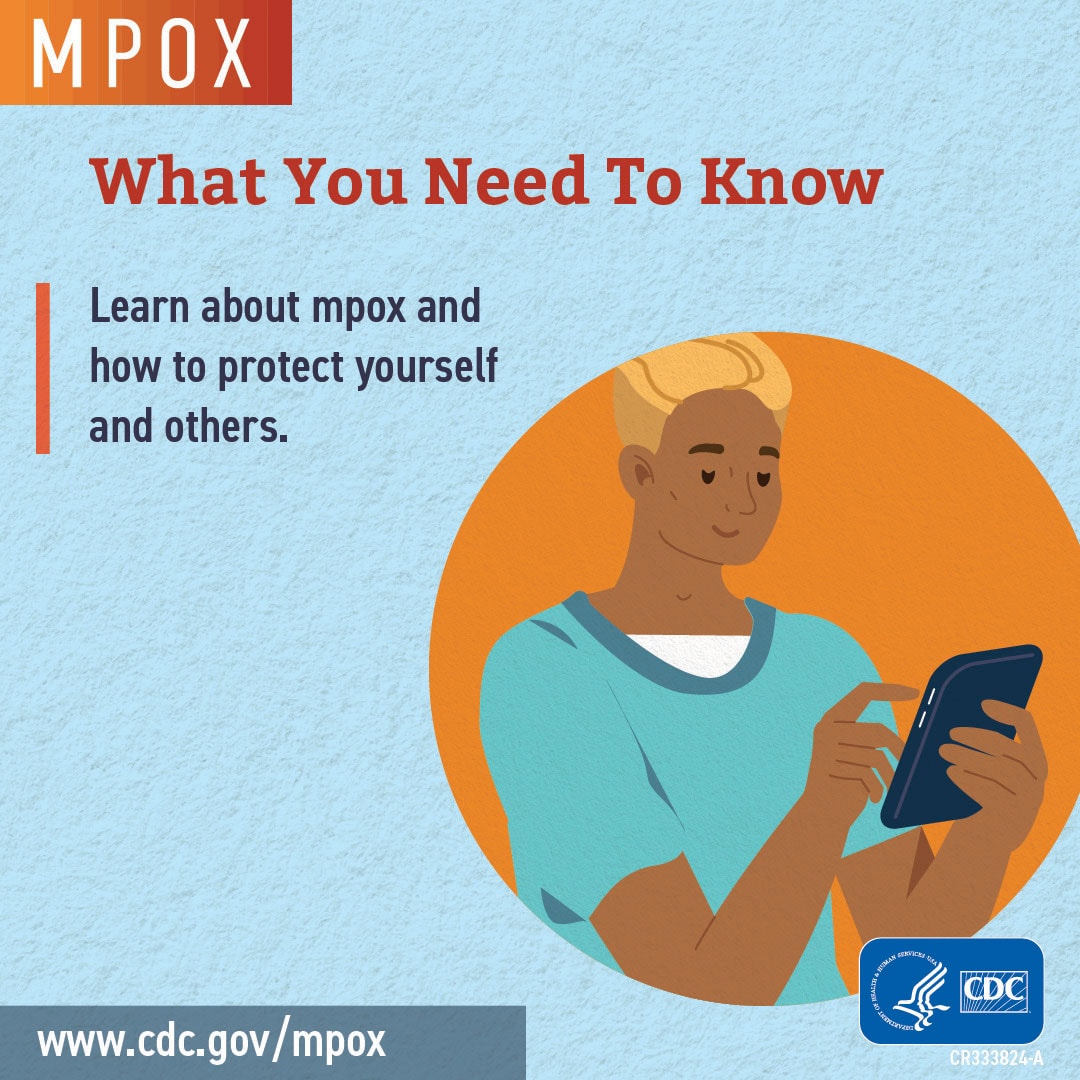What to know
- There are two types of mpox, clade I and clade II.
- There are current widespread outbreaks of clade I mpox in the Democratic Republic of the Congo (DRC), and cases and outbreaks have been reported in several neighboring countries.
- There also have been travel-associated clade I mpox cases in Europe and Asia. No cases of clade I mpox have been reported in the United States to date.
- Travelers to countries with sustained spread of clade I mpox should know how mpox is spreading. They should be vaccinated with two doses of JYNNEOS if they anticipate certain sexual activities while traveling.
- There's an ongoing global outbreak of clade II mpox that began in 2022. Cases continue to spread at low levels in many countries around the world.
- Continue to follow CDC’s current vaccine guidance to prevent clade II mpox, which will also help protect against clade I mpox.

Traveling
Current outbreaks and Travel Health Notices
There are two types of mpox, clade I and clade II. Travelers to countries where clade I mpox is spreading should know how mpox is spreading. They should be vaccinated with two doses of JYNNEOS if they anticipate certain sexual activities while traveling. There's an ongoing global outbreak of clade II mpox that began in 2022. Cases continue to spread at low levels in many countries around the world.
Visit Mpox in the United States and Around the World: Current Situation for more information.
CDC currently has a Level 2 Travel Health Notice (THN) for Clade I Mpox in Central and Eastern Africa. A Level 2 THN means to practice enhanced precautions when traveling to the affected areas.
Before traveling to an area with mpox spread
- Consider travel health and medical evacuation insurance.
- Learn more about which activities may increase your risk of exposure when you travel to a country where clade I mpox is spreading
- Visit a healthcare provider to discuss prevention and risk reduction strategies.
- If eligible, get vaccinated for mpox before you travel.
- Stay up to date on CDC Travelers' Health Notices and recommendations.
To avoid mpox while traveling
- Avoid any rash you see on others and consider minimizing skin-to-skin contact. This is particularly important at a rave, party, or club where there is minimal clothing and where there is direct, personal, often skin-to-skin contact.
- Do not kiss, hug, cuddle, or have sex with someone with mpox.
- Do not share eating utensils, dishes, plates, or cups with a person with mpox.
- Do not handle or touch the bedding, towels, or clothing of a person with mpox.
- If you're caring for someone with mpox, maintain distance, don't directly help the person with mpox with feeding or drinking, and be sure to wear personal protective equipment like gloves, a gown, and goggles if you must be around them.
- In areas where mpox is endemic (found regularly) avoid contact with animals that can carry the virus that causes mpox, such as rodents and primates.
- Wash your hands often with soap and water, or use an alcohol-based hand sanitizer, especially before eating or touching your face and after you use the bathroom.
Vaccination
If you are traveling, CDC recommends vaccination if you are eligible, which includes people who plan to travel to a country with a clade I mpox outbreak and anticipate participating in certain sexual activities.
Get vaccinated for mpox before you travel. If possible, get your first dose of the mpox vaccine at least 6 weeks before traveling. Get the second dose 4 weeks later. It takes about 2 more weeks to get the best protection against mpox.
If you get sick with mpox during or after travel
- Seek medical care immediately if you develop new, unexplained skin rash (lesions on any part of the body), with or without fever and chills, and avoid contact with others.
- Tell your doctor where you traveled for the last 21 days before you developed symptoms.
If you have mpox, do not travel
- Isolate at home or in another location until your symptoms are gone and your rash has healed; this means all scabs have fallen off and a fresh layer of skin has formed.
- It's especially important to not travel if you have fever, mouth sores, or respiratory symptoms such as sore throat, nasal congestion, or cough.
- If you have mpox and must travel, cover your rash and wear a well-fitting mask.
- Take additional steps to prevent spread to others.
- Be aware of the public health laws and regulations at your international destination.
- If you have been in contact with a person who has mpox and travel internationally, you may be subject to local public health laws and regulations.
- If you test positive for mpox, you may be required to isolate until you are no longer considered contagious.
- Check your destination's ministry of health or U.S. Embassy website to learn about requirements related to mpox at your destination.
- If you have been in contact with a person who has mpox and travel internationally, you may be subject to local public health laws and regulations.
- If you need medical care abroad, see Getting Health Care During Travel. Options for treatment might not be available in some countries.
